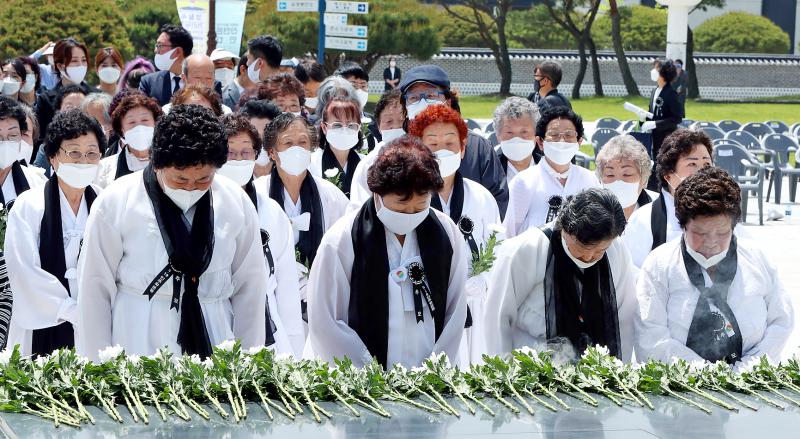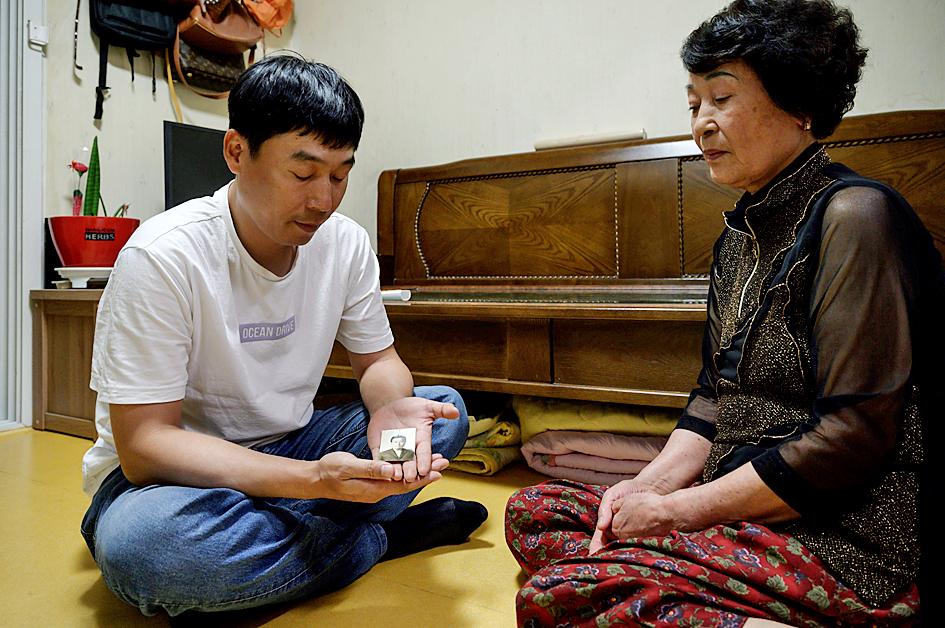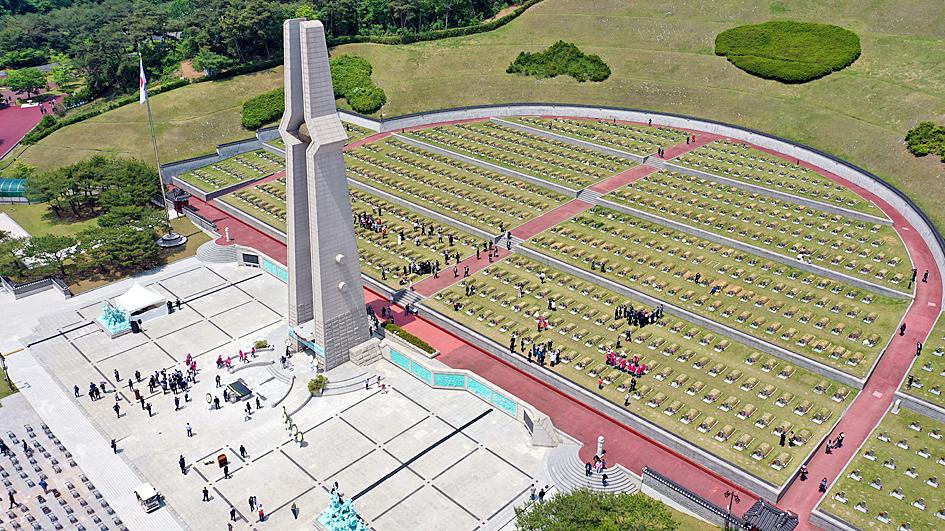It is 40 years since Choi Jung-ja saw her husband, who has been missing since South Korea’s military dictatorship killed hundreds of people when they crushed the pro-democracy Gwangju Uprising, a scar that burns in the country’s political psyche to this day.
On May 18, 1980, demonstrators protesting against then-South Korean president Chun Doo-hwan’s declaration of martial law confronted his troops and 10 days of violence ensued.
However, conservatives in the South still condemn the uprising as a communist-inspired rebellion backed by North Korea, while left-leaning South Korean President Moon Jae-in wants to enshrine it in the constitution.

Photo: EPA-EFE
Choi’s husband was 43 when he left their house in the southern city to buy oil for a heater at the family pub, never to return.
Once the violence was over Choi frantically searched for him, even opening random coffins in the streets covered with blood-stained Korean flags.
“I couldn’t continue after opening the third coffin,” she said. “The faces were covered with blood — there were no words to describe them. The faces were unrecognizable.”

Photo: AFP
She still takes medication to deal with the trauma, and curses whenever Chun appears on television, she said.
There is no agreed toll for Gwangju, with reports of secret burials on land and at sea. The military remaining in power for another eight years offered ample opportunity to dispose of the evidence.
Official bodies point to about 160 dead — including some soldiers and police — and more than 70 missing. Activists say up to three times as many may have been killed.

Photo: EPA-EFE
However, the search for justice has gone through multiple twists and turns and Gwangju is one of the most politicized historical events in a viciously polarized country.
At the time of the Gwangju Uprising, Chun’s military regime described it as a rebellion led by supporters of then-opposition leader Kim Dae-jung, who comes from nearby Sinan, and pro-Pyongyang agitators.
Kim was arrested, convicted of sedition and sentenced to death, but the penalty was commuted under international pressure and he was granted asylum in the US, before being elected president himself in the 1990s after the restoration of democracy and winning the 2000 Nobel Peace Prize.
Chun was convicted in 1996 of treason over Gwangju and bribery and condemned to hang, but his execution was commuted on appeal and he was released following a presidential pardon.
He still denies any direct involvement in the suppression of the uprising.
Today, Moon — who as a student took part in other anti-dictatorship protests — regularly highlights Gwangju, promising to reopen investigations into it and calling for it to be included in the constitution.
South Korea’s opposition seeks to paint Moon as a Pyongyang sympathizer, and Hannes Mosler of the University of Duisburg-Essen said the right sought to use Gwangju to discredit liberals by linking them to the “absolute evil” of the North.
“North Korea lies at the heart of polarization strategies in South Korea,” Mosler said. “Once a fake narrative is built around the Gwangju Uprising that connects it with North Korea, this provides the fuel for the polarization fire to burn further and further.”
Moon’s Democratic Par tlast month won a landslide election victory largely on the back of the government’s successful handling of the COVID-19 epidemic in the country.
While the city of Daegu was at the center of the outbreak, it is the last stronghold of the right and Moon’s party lost every one of the seats there.
The remains of about 40 people were discovered last year at the site of a former prison in Gwangju, where 242 relatives of missing people have given DNA samples in the hope of identifying corpses that have yet to come to light.
Among them is Cha Cho-gang, 81, whose son never returned after setting out to sell garlic at a market in the city, aged 19.
“My husband died three years ago,” she said. “His last wish was to bury our son’s remains before his own funeral.
“I have the same wish, but I don’t know if it will ever come true,” she added.

Packed crowds in India celebrating their cricket team’s victory ended in a deadly stampede on Wednesday, with 11 mainly young fans crushed to death, the local state’s chief minister said. Joyous cricket fans had come out to celebrate and welcome home their heroes, Royal Challengers Bengaluru, after they beat Punjab Kings in a roller-coaster Indian Premier League (IPL) cricket final on Tuesday night. However, the euphoria of the vast crowds in the southern tech city of Bengaluru ended in disaster, with Indian Prime Minister Narendra calling it “absolutely heartrending.” Karnataka Chief Minister Siddaramaiah said most of the deceased are young, with 11 dead

By 2027, Denmark would relocate its foreign convicts to a prison in Kosovo under a 200-million-euro (US$228.6 million) agreement that has raised concerns among non-governmental organizations (NGOs) and residents, but which could serve as a model for the rest of the EU. The agreement, reached in 2022 and ratified by Kosovar lawmakers last year, provides for the reception of up to 300 foreign prisoners sentenced in Denmark. They must not have been convicted of terrorism or war crimes, or have a mental condition or terminal disease. Once their sentence is completed in Kosovan, they would be deported to their home country. In

Brazil, the world’s largest Roman Catholic country, saw its Catholic population decline further in 2022, while evangelical Christians and those with no religion continued to rise, census data released on Friday by the Brazilian Institute of Geography and Statistics (IBGE) showed. The census indicated that Brazil had 100.2 million Roman Catholics in 2022, accounting for 56.7 percent of the population, down from 65.1 percent or 105.4 million recorded in the 2010 census. Meanwhile, the share of evangelical Christians rose to 26.9 percent last year, up from 21.6 percent in 2010, adding 12 million followers to reach 47.4 million — the highest figure

LOST CONTACT: The mission carried payloads from Japan, the US and Taiwan’s National Central University, including a deep space radiation probe, ispace said Japanese company ispace said its uncrewed moon lander likely crashed onto the moon’s surface during its lunar touchdown attempt yesterday, marking another failure two years after its unsuccessful inaugural mission. Tokyo-based ispace had hoped to join US firms Intuitive Machines and Firefly Aerospace as companies that have accomplished commercial landings amid a global race for the moon, which includes state-run missions from China and India. A successful mission would have made ispace the first company outside the US to achieve a moon landing. Resilience, ispace’s second lunar lander, could not decelerate fast enough as it approached the moon, and the company has